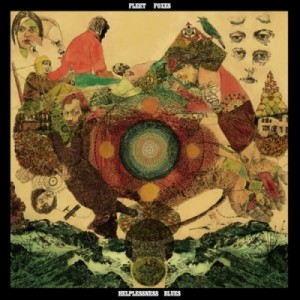Arctic Monkeys – Suck It and See
Released: June 7, 2011
Label: Domino
Purchase: iTunes | Insound | Amazon
Once hailed as the leaders of the Next British Invasion, Arctic Monkeys have returned with Suck It and See, once again proving that the British are still enchanting all these years later. However, this album represents a departure from the Monkeys’ traditional format of quick vocals and whimsical guitar riffs. With a heavier emphasis on distortion and an attitude befit for a grizzled, veteran rocker, Suck It and See sounds less like pop-rock and more like the album The Strokes should have made.
The album begins with the dark twang of singer Alex Turner’s guitar when suddenly his vocals pierce the vibe and lead into the song’s melodic first verse. Add a triumphant chorus and sprinkle in a bass walk or two and you have “She Thunderstorms” which sets the tone for the rest of the record. You won’t hear any of Turner’s near-breathless courses, though. Suck It and See relies more on a slower melody rather than the usual Arctic Monkeys tempo. While it’s depressing that they shook what used to be their trademark sound, “She Thunderstorms” demonstrates that the new, more mature Arctic Monkeys are just as talented as the band that made “Fluorescent Adolescent “ and “I Bet That You Look Good on the Dance Floor.”
But the most interesting song by far on the album isn’t “She Thunderstorms.” Oh no, my friends, that song is rather tamed compared to “Don’t Sit Down ‘Cause I Moved Your Chair.” Someone must have cranked up Nick O’Malley’s bass because this track is the hardest and heaviest track the Monkeys’ have ever produced. As strange as it feels to write this, this song almost sounds… metal? I’m perplexed that Arctic Monkeys did a song like this, but strangely I’m okay with it. They’ve shed the punk attitude and have taken up the mantle of total badasses. On another other album I would have hated it, but Suck It and See’s darker tone allows this song to shine. Of course, the lyrics are still sarcastic and ridiculous like all Alex Turner-penned songs, especially with the heavy bass and in your face drums. This track is sure to become a fan favorite at concerts because of the audio assault it wages on your ear drums. Just listening to it makes you want to wear a leather jacket, light a cigarette, and spray paint something vaguely political on a nearby building.
The whole album personifies what it means to be a rock star and no song embodies this theme better than the title track and obvious double entendre “Suck It and See.” The song follows Turner as he tries to seduce a young women with golden pick up lines like “You’re rarer than a can of dandelion and burdock/And those other girls are just postmix lemonade.” If you are British, this line is probably hilarious. If you’re like me and are confused why flowers are in a can, the line is basically “You’re a rare soda compared to Country Time lemonade mix”. Excluding the lack quick-fired lyrics, “Suck It and See” is probably the most traditional Arctic Monkeys song on the album. Every line is full of sarcasm and the boyish charm that we all fell in love with back in 2005.
Although there are a lot of gems layered throughout the album, Suck It and See is far from perfect. It suffers from a few duds, specifically the track they teased back in March, “Brick by Brick.” Fans of classic rock might enjoy this throwback track, but in my opinion its cheesiness and overall feel doesn’t fit well with the rest of the songs. The call and response verses are really corny and derail the album after its strong start (“She Thunderstorms”, “Black Treacle”). Thankfully they’re able to pull it back together and despite a couple dull moments, Suck It and See is a great example of how a band can successfully evolve and mature. Arctic Monkeys are back and prove that the Next British Invasion isn’t dead. It’s just getting started.
8.4
Standout Tracks: “Black Treacle”, “Don’t Sit Down ‘Cause I Moved Your Chair”, and “Suck It and See”





